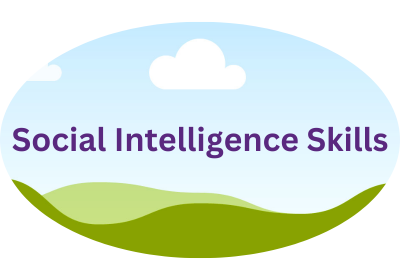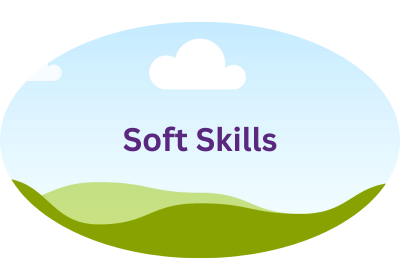
When I first heard the term social intelligence skills training my immediate thought was, that sounds very much like soft skills training. However, there are some key differences between the two:

Social intelligence skills training can be beneficial for people in a variety of settings, including the workplace, school, and personal life. In the workplace, social intelligence skills can help people to be more effective leaders, build stronger teams, and resolve conflicts. In school, social intelligence skills can help students to make friends, get along with their classmates, and succeed academically. In personal life, social intelligence skills can help people to build stronger relationships with their family and friends, and to be more successful in their interactions with others.
Here are some key components of social intelligence skills training:
- Emotional Awareness: Recognising and understanding your own emotions as well as the emotions of others. This involves being in tune with your feelings and being able to empathise with others’ emotions.
- Empathy: The capacity to put yourself in another person’s shoes, to understand their perspective, and to respond with compassion and consideration. Empathy is a fundamental aspect of social intelligence.
- Active Listening: Learning how to listen attentively and without judgment. This skill involves not just hearing words, but also understanding the underlying emotions and intentions behind what someone is saying
- Nonverbal Communication: Understanding and effectively using nonverbal cues such as body language, facial expressions, tone of voice, and gestures to convey messages and interpret the signals others are sending.
- Conflict Resolution: Developing strategies for resolving conflicts and disagreements in a constructive and respectful manner. This includes negotiation, compromise, and problem-solving skills.
- Social Awareness: Being attuned to social dynamics, group norms, and cultural differences. Socially intelligent individuals can adapt their behavior appropriately to different social contexts.
- Communication Skills: Learning effective communication techniques, including assertiveness, clarity, and diplomacy. Being able to express oneself clearly while respecting others’ viewpoints is crucial.
- Building and Maintaining Relationships: Developing skills for forming and sustaining meaningful relationships, including friendships, romantic partnerships, and professional connections.
- Self-Regulation: Managing one’s own emotions and behaviour in challenging social situations. This involves controlling impulsive reactions and maintaining composure.
- Feedback and Adaptation: Being open to feedback from others and using it as an opportunity for personal growth and improvement in social interactions.

On the other hand soft skills training, is a broader term that encompasses a wider range of interpersonal skills. It refers to the process of developing and improving a set of non-technical, interpersonal, and personal attributes that are valuable in various aspects of life, including the workplace. Unlike “hard skills,” which are job-specific and typically related to technical or specialised knowledge, soft skills are more universal and can be applied across different professions and social settings.
Here are some key components of soft skills training:
- Communication Skills: The ability to convey information clearly and effectively through both written and verbal means. This includes active listening, articulation, and the use of appropriate body language. Take a look at our communication skills online courses.
- Interpersonal Skills: Building and maintaining positive relationships with others. This involves empathy, conflict resolution, teamwork, and the ability to collaborate effectively.
- Emotional Intelligence: Understanding and managing one’s own emotions and recognising and empathising with the emotions of others. This skill is critical for effective communication and relationship-building. Take a look at our emotional intelligence online courses.
- Adaptability: The capacity to adjust to changing circumstances and environments, including being open to new ideas and being able to learn from experiences.
- Problem Solving: The ability to identify challenges, analyse situations, and find practical and creative solutions. Critical thinking and decision-making skills are often included in this category. Take a look at our problem solving online courses.
- Time Management: Efficiently using time and resources to achieve goals and meet deadlines. Being organised and prioritising tasks are essential components. Take a look at our time management online courses.
- Leadership: The capability to guide and motivate others to achieve common objectives. Leadership skills encompass delegation, decision-making, and the ability to inspire and influence a team. Take a look at our leadership online courses.
- Stress Management: Handling pressure and stressful situations in a healthy and productive manner. Techniques for stress reduction and maintaining mental well-being fall under this category. Take a look at our stress management online courses.
- Networking: Building and maintaining a professional network to access opportunities, information, and support. Effective networking involves interpersonal skills and relationship-building.
- Conflict Resolution: The ability to address and resolve conflicts and disagreements constructively and diplomatically. Take a look at our conflict resolution online courses.
So in conclusion, social intelligence skills training is a subset of soft skills training. It focuses on the specific skills that are necessary for understanding and interacting with others.
Both social intelligence and soft skills training are important for success in the workplace and in life. However, if you are looking to improve your ability to understand and navigate social situations, then social intelligence skills training is a good place to start. If you are looking to improve your overall interpersonal skills, then soft skills training is a better option. Both topics can effectively and inexpensively be delivered via online training, and there is a great selection to choose from.
Author: Carolyn Lewis
The multi award winning eLearning Marketplace is the UK’s largest provider of immediate access online training with customers in over 50 countries. Courses range from compliance and professional development to vocational qualifications up to Level 7. We work with subject matter experts and large e-learning publishers to bring our customers a unique catalogue of over 3500 online courses with a price match guarantee.
Not all courses are on the website so if you can’t find what you are looking for please do get in touch: 0844 854 9218
Source:







 UK: 0844 854 9218 | International: +44 (0)1488 580017
UK: 0844 854 9218 | International: +44 (0)1488 580017








